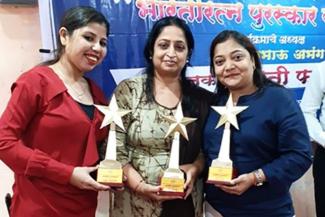
Sangeeta Wadhwa, a thalassemia major and psychologist, co-founder of Youth Thalassemic Alliance appeals for extensive premarital mandatory screening to bring down new occurrences and dreams to see India become like Cyprus one day - with zero thalassemia.
You are going to be speaking on thalassemia at a public platform in Delhi today. What is your talk going to focus on?
Being a psychologist counsellor I will be highlighting a range of topics affecting people with thalassemia.
- Psychosocial issues of patients
- How to reduce financial burden for patients and parents
- Problem with UDID (unique disability ID)
- Good management for a safe and secure life.
- Health Insurance - in India we don’t get Medical Insurance and it's our right.
- How to speed up awareness about thalassemia.
- How to engage gynaecologist, NGOs, patients groups, caregivers, stakeholders patient advocacy on one platform.
Could you tell us a bit about yourself and your thalassemia status?
I am 41 year blood transfusion dependent patient. By profession I am psychologist counsellor. I completed my MA in psychology and MBA in health care Hospital Administration. For the last 10 years I have been working as psychologist and PRO with Shri Hashu Advani Memorial Foundation Health Care Thalassemia centre located at Chembur, Mumbai.
In 2011, I set up my own NGO YTA (Youth Thalassemic Alliance) in memory of my sister, Payal Wadhwa. I lost her to thalassemia at age 27 in 2010. My guide my mentor, my Dad, is suffering from paralysis since a year. I lost many of my loved ones, but journey is still going on.
Thalassemia is not only my work or disorder, it is passion.
I am working and helping patients of thalassemia all over India by being associated with different NGOs. I am also appointed in patient advocacy groups as advisory committee member. I have been felicitated by many NGOs for my unconditional work towards the cause of Thalassemia.
Bullied As A Teen With Thalassemia
What was your childhood like?
It was full of rejections, struggle, lack of knowledge and confusion searching for many questions related to treatment.
What is a typical transfusion day like for you?
Previously, it was depressing, but now it's relaxing. Previously, it was the worst day but now it's full of energy and picnic. Now I know I need petrol for my car (body). It is a routine.
What changes have you made in your lifestyle because of thalassemia?
I need to prove to myself and compare myself with others, so I’m becoming workaholic. Now I am prepared for any challenges. And trying to stay motivated and positive 24/7.
What are some of your top aspirations in life?
- I want to know myself in a better way.
- I lost my sister but I want to save others.
- I want to reduce society's burden and I want to give back to society what I achieved in terms of blood, knowledge, treatment, etc.
- I have a dream to see my country become like Cyprus one day with zero Thalassemia
What treatment are you on?
Blood transfusion and chelation therapy.
Is bone marrow transplantation becoming a common consideration among patients with thalassemia?
Due to the reducing cost and local facilities available, the consideration to opt for a bone marrow transplant among patients is increasing. However, the consideration is more in patients below the age of 14 due to the higher success ratio.
What are the least understood aspects of thalassemia?
- Many patients and society at large still think that thalassemia is a disease but it is a genetic disorder.
- Another misconception is that is that the spread of thalassemia is limited to few communities only.
- Last, but not the least, people still consider that patients with thalassemia have a very low life expectancy.
You have been working for prevention and care of thalassemia for over a decade now. How did you first start?
By having blood donation drive at age 15 for my blood bank at a railway station.
You, along with a colleague, started Youth Thalassemic Alliance (YTA) to deal with problems faced by thalassemic youth. What are their key issues?
- Management and Awareness
- Unity amongst all
- To motivate other patients and settle down in their personal and professional life in terms of (job, marriage).
India is known as the thalassemia capital of the world with 40 million carriers. What are the 2 most important things the government should do to bring down numbers?
- To engage gynaecologist and to do mandatory thalassemia test.
- And to spread the awareness in colleges, marriage bureaus, matrimonial sites.







